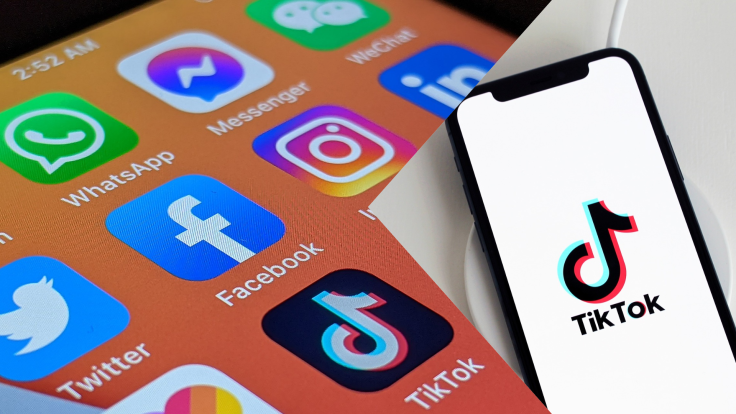TikTok's Viral 'Flip the Camera' Challenge Labelled As Cruel: 'It's Straight-Up Bullying' Internet Says
Across social media, people labelled it 'one of the meanest video formats.'

A TikTok trend that seemed harmless at first glance has quickly become one of the platform's most criticised fads, exposing what many have labelled as an unsettling appetite for mockery disguised as entertainment.
The viral 'Flip the Camera' challenge, which hinges on catching unsuspecting people on video in unflattering, often humiliating moments, has prompted widespread backlash.
From major influencers to everyday users, many are calling out the trend's casual cruelty, turning the spotlight away from its creators and toward the ethics of online behaviour.
How the Trend Works And Why It Hurts So Many
The challenge initially appeared as yet another TikTok dance setup. Teenagers mostly in school hallways and gymnasiums would film themselves doing a popular move, typically the 'scuba dance.'
@anonym1.alt they look so sweet #flipcameratrend ♬ My baby my baby - MadZ
But a few seconds into the clip, someone would flip the camera to expose the person recording the group. It should be noted that this trend has been around for a long time on social media, but earlier, it was appreciated for catching sweet moments where the person recording would be watching the group or individual with love and admiration.
People have done with their dogs, babies, partners and family members. However, the narrative in the latest practice has changed, as these videos are now often catching someone who will be socially considered 'ugly' off guard, unprepared, or in an unflattering position.
@nichellelaus The “Flip the Camera” trend might look harmless… but it’s not. It’s a trend built on recording someone without their consent, catching them off guard, and turning their reaction into entertainment. That’s not funny - that’s bullying. And during Anti-Bullying Week in Canada, it’s important we call it what it is. 📌 Humiliation isn’t a joke. 📌 You don’t know someone’s story. 📌 Online trends can have real-world impact. Kindness > clicks. Empathy > entertainment. Awareness > ignorance. Let’s raise the standard for how we treat each other — on and offline. #AntiBullyingWeek #BeKind #DigitalSafety ♬ Simple Things - Teddy Swims
The dynamic at play was immediately clear. The designated camera-holder was rarely part of the dance group, often someone perceived as an outsider or someone less socially accepted. The entire structure of the trend relies on their embarrassment. What made the videos go viral was not the dance but the moment the Internet was invited to laugh at someone who never agreed to be filmed.
This lack of consent and the intentional targeting of individuals who were excluded from the main activity turned what some framed as a lighthearted prank into something far more insidious.
'It's Straight-Up Bullying'
For weeks, the challenge flourished without major criticism. But the conversation shifted when users began calling out the trend as openly cruel. Across social media, people labelled it 'one of the meanest video formats' they had ever seen on the app, and one X user added bluntly, 'It's straight-up bullying.'
Others echoed the sentiment. TikTok creators began posting videos that dismantled the trend, analysing how it gamified schoolyard taunting and left unsuspecting participants facing ridicule from millions. The reactions under the 'Flipping the Camera' search tag soon included more critical commentary than actual challenge videos.
@nataliireynoldss Flip the camera trend #fyp #nataliereynolds ♬ anything - Adrianne Lenker
A content creator described how watching the clips brought back the familiar sting of being bullied. Across social media, users on platforms like X (formerly Twitter) expressed similar disgust by calling the trend disrespectful, harmful, and indicative of a broader 'surveillance culture' that normalises filming strangers for entertainment.
“ppl who are clueless to what’s going on” it’s exactly the problem of this ridiculous trend, it’s straight up bullying and some of these kids are doing it to homeless and disabled people, it’s bullying there’s no other word for it https://t.co/Ct635MFtK3 pic.twitter.com/xM5tAIBQ8k
— mari (@cvnnkett) November 13, 2025
The trend grew so widespread that the backlash became a trend of its own, a rare moment of collective accountability that reinforced how deeply bullying, especially digital, affects real people.
A Viral Lesson in Digital Responsibility
While TikTok trends evolve at breakneck speed, the debate sparked by 'Flip the Camera' has outlasted the challenge itself. The criticism has effectively overtaken the trend, stripping away any social rewards and curbing participation.
As a result, the challenge has already begun to fade. But the damage remains. What started as a dance, or rather a sweet trend, became an act of bullying.
© Copyright IBTimes 2025. All rights reserved.





















